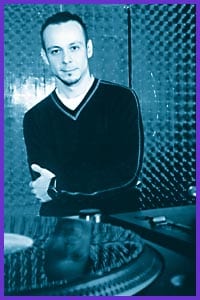“What is House?” asks Corey McPhee, aka DJ Cory Activate, who spins at Five and The Barn. “What it is to me, is different than what it would be to Sean Ryker, different than it is to Marc Falco, or Sylvain Girard.
“It used to be easier than it is now. House, now, has so many divisions inside of itself. Everyone has their own little niche.”
The roots of House music, 10-year lord of the dance floor, are easily agreed upon. The story involves two DJs (Frankie Knuckles and Larry Levan) who went from playing disco at the Continental Baths in New York City to anchor separate clubs – The Paradise Garage in New York and The Warehouse in Chicago.
The pair almost single-handedly saved the respectability of dance music in the face of the “disco sucks” backlash of the late 1970s.
Levan and Knuckles breathed new life into a tired, over-commercialized music by marrying the funk of disco to the new, percussion-oriented sound coming out of Europe. “It’s disco with a harder beat,” says Sean Ryker (who spins at Fly), “as far as real House music goes.”
Paul Grace (The Barn and Fantasy Ball), one of the first DJs to play House in the Toronto gay scene, agrees. “The origin of House is a mixture of that R&B-disco sensibility, with that European precision percussion,” he says. “Imagine mixing Kraftwerk with Rachel Fleming. You’re now starting with the roots of the music.”
History is one thing; the present and future are something else.
Opinions differ and controversy sets in once House begins to mutate and subdivide.
Shortly after the birth of House, the music re-seeded itself back in Europe, where DJs cranked up the tempo, introduced breakbeats and gave birth to the Rave scene. In Detroit, DJs invented Acid House – trippy with feedback from emerging bass synthesizer technology and inspired by the free flow of LSD.
The divisions grew and divided again – spawning Jungle, Drum ‘n’ Bass, Progressive, Hardcore and recently, Trance, Tribal and Tech House.
“It’s really evolved in the last seven, eight years. It’s not what it used to be,” says McPhee, known for playing a circuit party sound.
“The whole Disco Loop House – the real traditional House that started off as a really soulful, garagey sound that emanated from Chicago and parts of New York – it doesn’t seem to have the energy and drive that’s moving people in the gay community right now.”
Sylvain Girard (who spins at Five in Toronto and for the Prova Group) agrees. “In the gay scene right now, they want the circuit sound,” he says, somewhat despondently. “They want Madonna. They want Cher. They want Jennifer Lopez. They need it.”
“We used to lead the scene,” complains Ryker of gay clubs. “Now it’s backwards. We’re not even following. We’re just going totally in the wrong direction.”
“I think [the circuit sound] put us behind, to be honest,” says Girard. “Because it became big – so, so, big – it became tacky, actually. I still like the Circuit sound. I made a CD of that sound. But it’s this kind of recipe of beats, snare-drum rolls and organs and keyboards. All these remixers found this recipe at those parties and remixed Madonna and Cher with those sounds.”
It’s a sound that is tailor-made not just for the huge, all-night circuit parties but also for the accompanying drug use. “You can see, there’s a certain point in the music when the bumpers come out,” says Gigi (a promoter at Elements), referring to the party drug Special K. “Everyone does a bump when a drum roll’s about to go off.”
Gigi remembers a conversation that he says epitomizes the link: “A friend of mine heard a DJ playing at The Web [who] I thought was great. And the next day he said: ‘The DJ really confused me. I didn’t know if we should do K or coke.'”
A lot of the DJs feel frustrated at the current state of the art.
Girard feels it’s up to the DJs and producers in the gay scene to almost re-educate club-goers. “There’s still underground House – the remixing part is something else. There’s still good House, like it used to be in ’89. There’s not enough DJs that play underground House – especially in the gay scene. We have to blend that in.”
A question that hangs over the future of House is: Will it become so mainstream, like disco, that it will lose all its meaning? Might House die under its own straining weight?
“I don’t think it’s going anywhere,” assures Tyrone Solomon. Following in the footsteps of his DJing father, Solomon’s been playing House for more than 10 years with partner Peter Primiani (they’re known together as Peter and Tyrone and spin at Five, Fly and run 83 West Records).
“All the other things, they get big for a bit,” says Solomon. “But it always goes back to House. It’s so dance friendly. Even if you can’t dance, you can bop your head to it – four beat – it’s not complex. You don’t have to worry about crazy offbeat swing patterns or anything like that.”
“I don’t think it’ll ever go away,” agrees veteran DJ Matt C (who spins at Industry and NASA), taking a slightly more spiritual tack. “Because with House, bringing the drum to the forefront of the music, it appeals to our tribal nature. What we know as House music will never go away.
“The power of the drum is only just being learnt.”

 Why you can trust Xtra
Why you can trust Xtra


